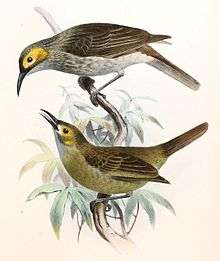Kadavu honeyeater
The Kadavu honeyeater (Meliphacator provocator) is a species of bird in the family Meliphagidae. It is the only species placed in the genus Meliphacator. It is endemic to the islands of Kadavu in Fiji. Its natural habitats are subtropical or tropical moist lowland forests and tropical mangrove forests.
| Kadavu honeyeater | |
|---|---|
 | |
| Scientific classification | |
| Kingdom: | Animalia |
| Phylum: | Chordata |
| Class: | Aves |
| Order: | Passeriformes |
| Family: | Meliphagidae |
| Genus: | Meliphacator Mathews, 1930 |
| Species: | M. provocator |
| Binomial name | |
| Meliphacator provocator (Layard EL, 1875) | |
| Synonyms | |
|
Xanthotis provocator | |
The Kadavu honeyeater is described as being fairly large, somewhat resembling the spotted honeyeater, but with a yellowish-green bare skin eye-patch, bordered towards the rear by light green feathering on the ear coverts. It is dark streaked beneath with a whitish unstreaked central strip, and has upperparts which are greenish-grey with pale fringes to the wing feathers. This bird makes loud, ringing, friarbird-type calls, and prefers the tall mangroves along creek margins.
This species was previously placed in the genus Xanthotis. It was moved to Meliphacator based on the results of a molecular phylogenetic study published in 2019.[2][3]
References
- BirdLife International 2018. Meliphacator provocator. The IUCN Red List of Threatened Species 2018: e.T22704119A130254111. https://dx.doi.org/10.2305/IUCN.UK.2018-2.RLTS.T22704119A130254111.en. Downloaded on 01 February 2020.
- Andersen, M.J.; McCullough, J.M.; Friedman, N.R.; Peterson, A.T.; Moyle, R.G.; Joseph, L.; Nyári, A.S. (2019). "Ultraconserved elements resolve genus-level relationships in a major Australasian bird radiation (Aves: Meliphagidae)". Emu. 119 (3): 218–232. doi:10.1080/01584197.2019.1595662.
- Gill, Frank; Donsker, David; Rasmussen, Pamela, eds. (2020). "Honeyeaters". IOC World Bird List Version 10.1. International Ornithologists' Union. Retrieved 25 February 2020.
